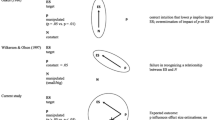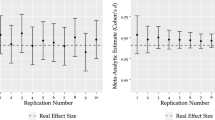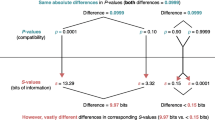Abstract
We argue for a naturalistic account for appraising scientific methods that carries non-trivial normative force. We develop our approach by comparison with Laudan’s (American Philosophical Quarterly 24:19–31, 1987, Philosophy of Science 57:20–33, 1990) “normative naturalism” based on correlating means (various scientific methods) with ends (e.g., reliability). We argue that such a meta-methodology based on means–ends correlations is unreliable and cannot achieve its normative goals. We suggest another approach for meta-methodology based on a conglomeration of tools and strategies (from statistical modeling, experimental design, and related fields) that affords forward looking procedures for learning from error and for controlling error. The resulting “error statistical” appraisal is empirical—methods are appraised by examining their capacities to control error. At the same time, this account is normative, in that the strategies that pass muster are claims about how actually to proceed in given contexts to reach reliable inferences from limited data.
Similar content being viewed by others
References
Achinstein, P. (1998). Why philosophical theories of evidence Are (and Ought to Be) ignored by scientists. Philosophy of Science, 67 (Proceedings), S180–S192.
Achinstein, P. (2008). Mills’ sins. In D. Mayo & A. Spanos (Eds.), Error and inference: Recent exchanges on the philosophy of science, inductive-statistical inference, and reliable evidence. Cambridge: Cambridge University Press (forthcoming).
Bartz-Beilestein, T. (2008). How experimental algorthmics can benefits from Mayo’s extensions to Neymoan-Pearson theory of testing (this volume).
Chalmers A. (1999). What is this thing called science? (3rd ed). Indianapolis/Cambridge, Hackett Publishing Company, Inc
Chalmers, A. (2008). In D. Mayo, & A. Spanos (Eds.), Error and inference: Recent exchanges on the philosophy of science, inductive-statistical inference, and reliable evidence. Cambridge: Cambridge University Press (forthcoming).
Dreske F. (1985). Precis of knowledge and the flow of information. In: Kornblith H. (eds) Naturalizing epistemology. Cambridge, Mass.: MIT Press, pp. 169–188
Dreske F. (2000). Perception. Knowledge and belief: Selected essays. Cambridge, Cambridge University Press
Giere, R. (1996). Scientific inference: Two points of view, Philosophy of Science, 64 (Proceedings), S180–S184.
Giere R. (2004). Critical hypothetical evolutionary naturalism. In: Heyes C., Hull D.L. (eds) Selection theory and social construction: The evolutionary naturalistic epistemology of Donald T Campbell. Albany, State University of New York, pp. 53–70
Giere R. (2006). Scientific perspectivism. Chicago, University of Chicago Press
Glymour, C. (2008). Searching for explanations, searching for truths. In D. Mayo & A. Spanos (Eds.), Error and inference: Recent exchanges on the philosophy of science, inductive-statistical inference, and reliable evidence. Cambridge: Cambridge University Press (forthcoming).
Goldman A. (1985). What is justified belief?. In: Kornblith H. (eds) Naturalizing epistemology. Cambridge, Mass, MIT Press, pp. 91–114
Goldman A. (2002). Pathways to knowledge: Private and public. New York, Oxford University Press
Kitcher P. (1992). The naturalists return. The Philosophical Review 101(1): 53–114
Kornblith H. (1985). Introduction: What is naturalistic epistemology?. In: Kornblith H. (eds) Naturalizing epistemology. Cambridge Mass, MIT Press, pp. 1–14
Kornblith, H. (2002). Knowledge and its place in nature. Oxford: Oxford University Press; New York: Clarendon Press
Kuhn, T. (1962, 1970). The structure of scientific revolutions (2nd ed.). Chicago, University of Chicago Press.
Laudan L. (1987). Progress or rationality? The prospects for normative naturalism. American Philosophical Quarterly 24: 19–31
Laudan L. (1990). Normative naturalism. Philosophy of Science 57: 44–59
Leplin J. (1990). Renormalizing epistemology. Philosophy of Science 57: 20–33
Mayo, D. (1991). Novel evidence and severe tests. Philosophy of Science, 58, 523–552. (Reprinted in The Philosopher’s Annual, XIV, 203–232).
Mayo D. (1996). Error and the growth of experimental knowledge. Chicago, The University of Chicago Press
Mayo, D. (1999). Making progress with Laudan’s Problems: 1977–1997. In Progress and its problems after 20 years. The National Autonomous University of Mexico (in Spanish).
Mayo, D. (2000). What is this thing called philosophy of science? In Review symposium of A. Chalmers’ What is this thing called Science? Metascience, 9 (July 2000), 179–188.
Mayo, D. (2002). Theory testing, statistical methodology, and the growth of experimental knowledge. In The scope of logic. Methodology and philosophy of science: Volume One of the 11th International Congress of Logic, Methodology and Philosophy of Science, Cracow, August 1999. Dordrecht: Kluwer Academic Publishers.
Mayo D. (2006). Critical rationalism and its failure to withstand critical scrutiny. In: Cheyne C., Worrall J. (eds) Rationality and reality: Conversations with Alan Musgrave, Kluwer sereis studies in the histroy and philosophy of science. The Netherlands, Springer, pp. 63–99
Mayo, D. (2008a). Severe testing, error statistics, and the growth of theoretical knowledge. In D. Mayo & A. Spanos (Eds.), Error and inference: Recent exchanges on the Philosophy of Science, Inductive-Statistical Inference, and Reliable Evidence. Cambridge: Cambridge University Press (forthcoming).
Mayo, D. (2008b). External validity and the rational scrutiny of models of rationality. Philosophy of Science (Proceedings), forthcoming.
Mayo, D. (forthcoming). How to discount double counting when it counts. The British Journal for the Philosophy of Science.
Mayo D., Spanos A. (2004). Methodology in practice: statistical misspecification testing. Philosophy of Science(Symposia) 71: 1007–1025
Mayo, D., & Spanos, A. (Eds.) (2008). Error and inference: Recent exchanges on the philosophy of science, inductive-statistical inference, and reliable evidence. Cambridge: Cambridge University Press (forthcoming).
Mayo, D., & Spanos, A. (forthcoming). Error statistics. In P. S. Bandyopadhyay & M. Forster (Eds.), The handbook of philosophy of science (7). Elsevier: Amsterdam, The Netherlands.
Parker, W. (2008). Computer simulation through an error-statistical lens.
Rosenberg A. (1990). Normative naturalism and the role of philosophy. Philosophy of Science 57: 34–43
Staley, K. (2008). Error-statistical elimination of alternative hypotheses (This volume).
Taper, M. Staples, D. F., & Shepard, B. B. (2008). Model structure adequacy analysis: Selecting models on the basis of their ability to answer scientific questions (this volume).
Worrall J. (1999). Two cheers for naturalized philosophy of science—or: Why naturalized philosophy of science is not the cat’s whiskers. Science & Education 8(4): 339–361
Worrall, J. (2002). New evidence for old. In P. Gardenfors, J. Wolenski, & K. Kijania-Placek (Eds.), The scope of logic. Methodology and philosophy of science: Volume One of the 11th International Congress of Logic, Methodology and Philosophy of Science, Cracow, August 1999. Dordrecht: Kluwer Academic Publishers.
Worrall, J. (2008). Error, tests and theory confirmation. In D. Mayo & A. Spanos (Eds.), Error and inference: Recent exchanges on the philosophy of science, inductive-statistical inference, and reliable evidence. Cambridge: Cambridge University Press (forthcoming).
Author information
Authors and Affiliations
Corresponding author
Rights and permissions
About this article
Cite this article
Mayo, D., Miller, J. The error statistical philosopher as normative naturalist. Synthese 163, 305–314 (2008). https://doi.org/10.1007/s11229-007-9303-5
Received:
Accepted:
Published:
Issue Date:
DOI: https://doi.org/10.1007/s11229-007-9303-5




